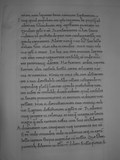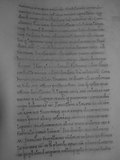Kenyon College Leaf 39
This leaf comes from a rare manuscript of Livy's History of Rome (completed in about 9 A.D.) copied in Italy in the middle of the fifteenth century. It measures 22.5 x 16 cm and its vellum is very well prepared, though some rubbing of the ink has cast a shadow over the text block of some pages. The Humanistic script is crisp, clear, and without adornment; an exception is the Denison leaf, with its striking initial "H." See Denison University Leaf 39 for more information about this manuscript.
Text: This leaf contains the text of Livy's History, Book 27, Chapters 9-10. The English translation is that of Cyrus Edmonds (1850), via Project Gutenberg.
Reconstruction Note! In Ege's original manuscript, this leaf was followed by what is now Leaf 39 in the University of Colorado, Boulder portfolio.
 Kenyon Leaf 39 Recto
Kenyon Leaf 39 Recto
Kenyon College Leaf 39 Recto
 Kenyon Leaf 39 Recto Transcription
Kenyon Leaf 39 Recto Transcription
-triam, noui legantur, breui neminem superfuturum. itaque quod propediem res ipsa negatura sit, priusquam ad ultimam solitudinem atque egestatem perueniant, negandum populo Romano esse. si consentientes in hoc socios uideant Romani, profecto de pace cum Carthaginiensibus iungenda cogitaturos: aliter nunquam uiuo Hannibale sine bello Italiam fore. haec acta in conciliis. Triginta tum coloniae populi Romani erant; ex iis duodecim, cum omnium legationes Romae essent, negauerunt consulibus esse unde milites pecuniamque darent. eae fuere Ardea, Nepete, Sutrium, Alba, Carseoli, Sora, Suessa, Circeii, Setia, Cales, Narnia, Interamna. noua re consules icti cum absterrere eos a tam detestabili consilio uellent, castigando increpandoque plus quam leniter agendo profecturos rati, eos ausos esse consulibus dicere aiebant quod consules ut in senatu pronuntiarent in animum inducere non possent; non enim detractationem eam munerum militiae, sed apertam defectionem a populo Romano esse. redirent itaque propere in colonias et tamquam integra re, locuti magis quam ausi tantum nefas, cum suis consulerent. admonerent non Campanos neque Tarentinos esse eos sed Romanos, inde oriundos, inde in colonias atque in agrum bello captum stirpis augendae causa missos. quae liberi parentibus deberent, ea illos Romanis debere, si ulla pietas, si
 Kenyon Leaf 39 Recto Translation
Kenyon Leaf 39 Recto Translation
If the old soldiers did not return to their country, and fresh ones were enlisted, that in a short time there would be no one left. That, therefore, they must refuse to the Roman people, before they came to utter desolation and want, what shortly their very condition would refuse. If the Romans saw their allies unanimous on this point that they would then certainly think of making peace with the Carthaginians; otherwise, Italy would never be without war while Hannibal was alive." Thus they discoursed in their meetings. The Roman people had at that time thirty colonies. Twelve of these, for they all had embassies in Rome, told the consuls that they had not whence to furnish either men or money. The twelve were Ardea, Nepete Sutrium, Alba, Carseoli, Cora, Suessa, Cerceii, Setia, Cales Narnia, Interamna. The consuls, astonished at this new proceeding, were desirous to deter them from so hateful a measure and, considering that they could effect this better by censure and remonstrance than by mild means, said that "they had dared to say to the consuls what the consuls could not bring their minds to declare in the senate; for that this was not refusal to perform military service, but an open defection from the Roman people. They desired, therefore, that they would return to their colonies speedily, and that, considering the subject as untouched, as they had only spoken of, but not attempted, so impious a business, they would consult with their countrymen. That they would warn them that they were not Campanians or Tarentines, but Romans; that from thence they derived their origin, and thence were sent out into colonies and lands captured from the enemy, for the purpose of increasing the population. That they owed to the Romans what children owed to parents, if they possessed any natural affection...
 Kenyon Leaf 39 Verso
Kenyon Leaf 39 Verso
Kenyon College Leaf 39 Verso
 Kenyon Leaf 39 Verso Transcription
Kenyon Leaf 39 Verso Transcription
memoria antiquae patriae esset. consulerent igitur de integro; nam tum quidem quae temere agitassent, ea prodendi imperii Romani, tradendae Hannibali uictoriae esse. cum alternis haec consules diu iactassent, nihil moti legati neque se quid domum renuntiarent habere dixerunt neque senatum suum quid noui consuleret, ubi nec miles qui legeretur nec pecunia quae daretur in stipendium esset. cum obstinatos eos uiderent consules, rem ad senatum detulerunt, ubi tantus pauor animis hominum est iniectus ut magna pars actum de imperio diceret: idem alias colonias facturas, idem socios; consensisse omnes ad prodendam Hannibali urbem Romanam. [10] Consules hortari et consolari senatum et dicere alias colonias in fide atque officio pristino fore: eas quoque ipsas quae officio decesserint si legati circa eas colonias mittantur qui castigent, non qui precentur, uerecundiam imperii habituras esse. permissum ab senatu iis cum esset, agerent facerentque ut e re publica ducerent, pertemptatis prius aliarum coloniarum animis citauerunt legatos quaesiueruntque ab iis ecquid milites ex formula paratos haberent. pro duodeuiginti coloniis M. Sextilius Fregellanus respondit et milites paratos ex formula esse, et si pluribus opus esset plures daturos, et quidquid aliud imperaret uelletque populus Romanus enixe factu-
 Kenyon Leaf 39 Verso Translation
Kenyon Leaf 39 Verso Translation
...or any gratitude towards their mother country. That they should, therefore, consider the matter afresh; for that certainly what they then so rashly meditated, was the betraying the Roman empire, and putting the victory in the hands of Hannibal." The consuls having spent a long time in exchanging arguments of this kind, the ambassadors, who were not at all moved by what they said, declared, that "they had nothing which they could carry home, nor had their senate any thing fresh to devise, having neither men to be enlisted, nor money to be furnished for pay." The consuls, seeing that they were inflexible, laid the matter before the senate; where the alarm excited in the minds of all was so great, that "the greater part declared it was all over with the empire; that the rest of the colonies would take the same course, and that all the allies had conspired to betray the city of Rome to Hannibal." [10.] The consuls endeavoured to encourage and console the senate, telling them that "the other colonies would maintain their allegiance, and continue in their former state of dutiful obedience, and that those very colonies who had renounced their allegiance, would be inspired with respect for the empire, if ambassadors were sent round to them to reprove and not entreat them." The senate having given them permission to do and to act as they might conceive best for the state; after sounding the intentions of the other colonies, the consuls summoned their ambassadors, and asked them whether they had their soldiers ready according to the roll? Marcus Sextilius of Fregellae replied, in behalf of the eighteen colonies, that "they both had their soldiers ready according to the roll, and if more were wanting would furnish more, and would perform with all diligence whatever else the Roman people commanded and wished...